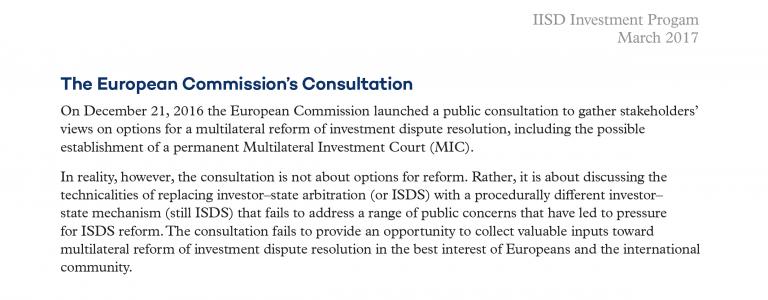Reply to the European Commission’s public consultation on a multilateral reform of investment dispute resolution
The European Commission launched a public consultation to gather views on options for a multilateral reform of investment dispute resolution on December 21, 2016. This commentary outlines IISD's reaction.
The European Commission launched a public consultation on December 21, 2016 to gather stakeholders’ views on options for a multilateral reform of investment dispute resolution, including the possible establishment of a permanent Multilateral Investment Court (MIC).
While the Commission has not released language for its MIC proposal, it presumably builds on the Investment Court System (ICS) embedded in recent EU agreements with Canada and Vietnam, comprising a First Instance Tribunal and an Appeal Tribunal with full-time judges empowered to decide on cases initiated by foreign investors against their host states.
In this commentary, IISD rejects the Commission’s ICS proposal as it fails to address most of the flaws that have led to public concern regarding ISDS. IISD further rejects the MIC proposal, which would cement the flawed ISDS regime and, worse, extrapolate it to the multilateral level. Despite the procedural improvements brought by both proposals vis-à-vis traditional ISDS, they fall short of advancing satisfactory alternatives to the unidirectional, exclusionist and unbalanced nature of the existing ISDS regime. IISD regrets that the Commission’s consultation was based on narrow questions that fail to reach the core elements of much-needed reform in investment dispute settlement. The consultation was a missed opportunity for the Commission to obtain valuable inputs toward multilateral reform of investment dispute resolution in the best interest of Europeans and the international community.
You might also be interested in
Stabilization Clauses: The hidden provisions that can hinder tax and investment policy reform
Stabilization clauses should no longer automatically be included in contracts between states and investors. If they are, they should, at a minimum, build on the latest international standards on stabilization to avoid being a barrier to sustainable development.
What Drives Investment Policy-makers in Developing Countries to Use Tax Incentives?
The article explores the reasons behind the use of tax incentives in developing countries to attract investment, examining the pressures, challenges, and alternative strategies that exist.
Brussels push to ban ECT disputes gains traction
Two arbitration victories for Spain under the Energy Charter Treaty (ECT) have sparked hopes that efforts to halt the intra-EU disputes that dominate claims under the controversial global pact are starting to bear fruit. Climate scholars, like IISD's Lukas Schaugg, believe the tribunal wins this month signal growing acceptance in international legal circles that EU investors cannot bring ECT claims against other member state governments.
Sustainability rules to impact global trade
Developed countries should consult developing countries in crafting global sustainability rules to prepare these markets for the impact of stringent regulations that may hamper global trade, a United Nations official said at IISD's recent Investment Policy Forum.
